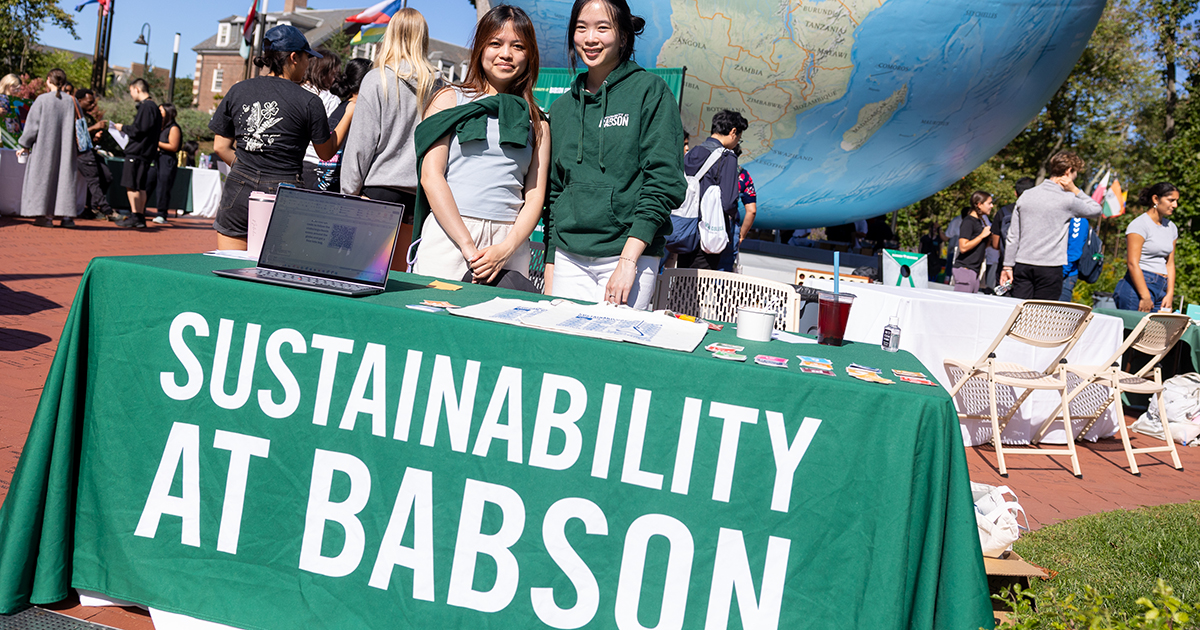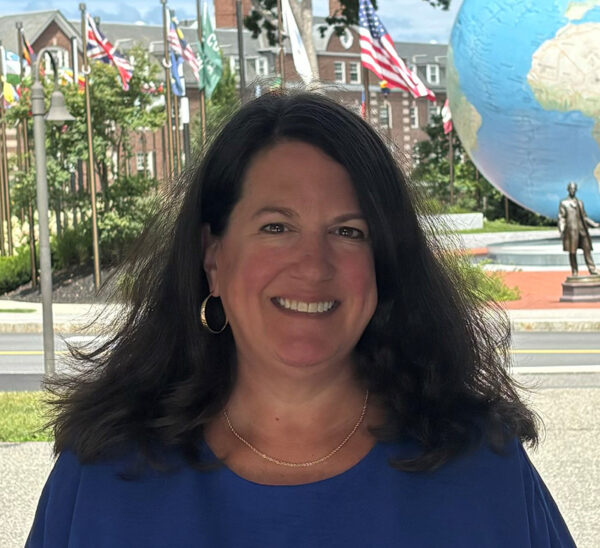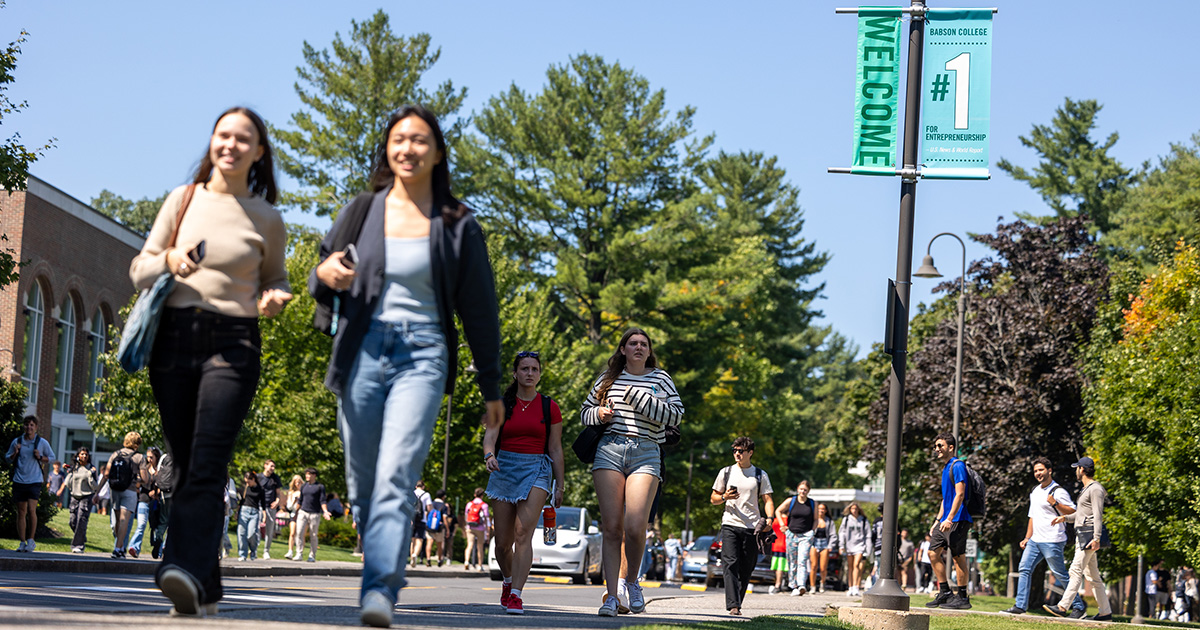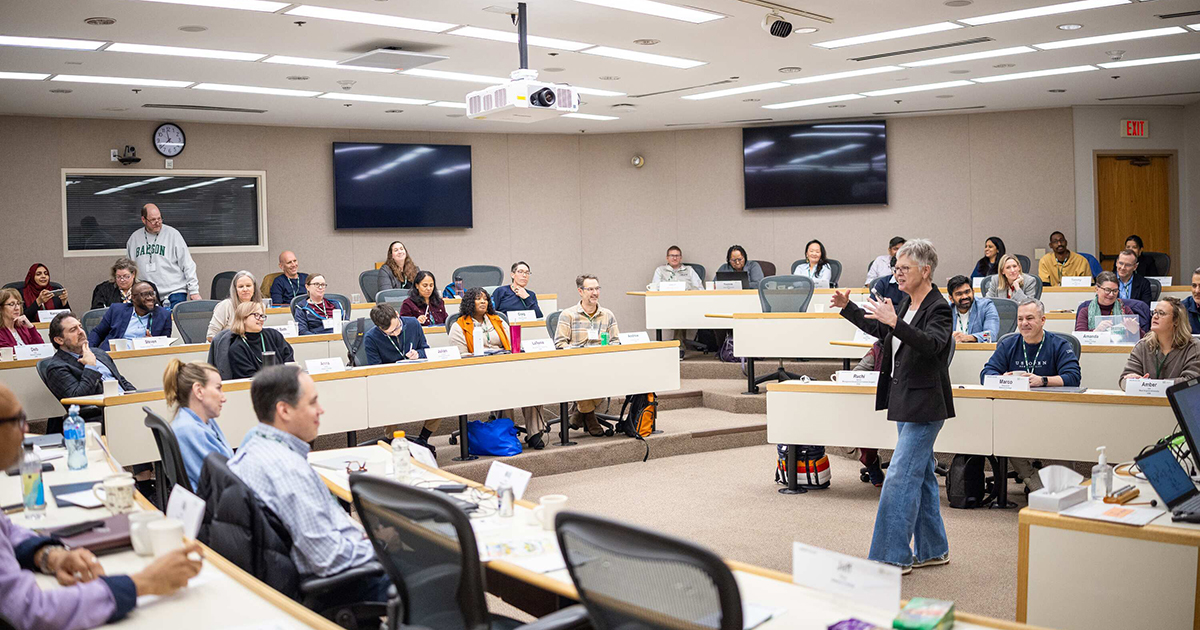Going Greener: Babson’s Campus-Wide Sustainability Gets a Boost

Across every step of Babson’s lush, 370-acre Wellesley campus, every corner of its 18 residence halls and 11 special institutes and centers, and in every savory, locally sourced bite in the dining hall, Babson is buzzing with eco-friendly initiatives.
From waste-reduction programs to electric car charging stations, Babson’s students, staff, and faculty continue to find innovative ways to go green. And Leila Lamoureux MBA’18, Babson’s Director of Sustainability and Campus Utilization, is weaving those environmental enterprises into a cohesive sustainability plan.
“We need to bring all the great things we are already doing together into a cohesive narrative,” Lamoureux explains. “We need to dig into all of these initiatives and ultimately use them to shape our sustainability strategy moving forward.”
It’s all part of a strategic approach to survey sustainability efforts around the College, engage all parts of the community, and craft a far-reaching plan to enhance the College’s existing efforts and elevate future sustainability plans.
“The role is really about bringing people together from across campus to identify what we’re doing and what we should be doing in terms of sustainability,” Lamoureux said.
Babson will have an opportunity to show off its sustainability efforts this week as host of the prestigious 2024 Global Consortium of Entrepreneurship Centers (GCEC) Conference. From November 14-16, the College will be welcoming thought leaders from around the globe to discuss the future of entrepreneurship.
All carbon emissions from travel and lodging to the conference will be offset through a partnership with TripZero, a sustainability focused travel agency. The event will feature local, sustainable food options from Atlantic Sea Farms and highlight alumni by providing plant-based dumplings from High Time Foods, co-founded by Aakash Shah MBA’22 and Damian Felchlin MBA’21.

To further reduce waste, Babson will use the GCEC app to update conference information such as digital agendas and surveys. The digital and eco-friendly signage will continue on campus, where solar power stations will be providing electricity for the conference and attendees will receive refillable water bottles.
Engaging the Babson Community: Students Lead the Way
Student engagement is key to Babson’s sustainability mission, and through the Institute for Social Innovation, students can participate in initiatives such as a “Slash the Trash” challenge to reduce waste on campus and a “Dark Dorm Challenge” to conserve energy. The annual Sustainability Fair, run entirely by students, showcases sustainability initiatives and practices in collaboration with community partners.
The Sustainability Intern Program, under the guidance of Josh Stevenson, associate director of social impact and sustainability at the Institute, connects students with campus stakeholders and the local Wellesley and Needham communities. This program encourages students to take ownership of sustainable practices and provides them with real-world experience in environmental advocacy.
According to Lamoureux, one of the most rewarding aspects of her role has been interacting with Babson’s enthusiastic students. “They’re in it to win it,” she says. “Even when tasked with activities like reviewing reports or identifying sustainability trends, they take it on with enthusiasm.”
Student leaders also are tackling composting and food waste initiatives, among others. Lamoureux recalls a memorable conversation with Grace Pryce ’26, president of Babson’s student Sustainability Club and a student championing expanded composting on campus. “I told her, ‘You’re the Babson student. You tell me what we’re going to do,’ ” Lamoureux laughed. Since providing Pryce with the initiative, she has identified a potential partner to expand composting on campus.
Driving Sustainable Learning
A unique facet of Babson’s sustainability mission is its integration into the academic curriculum. Cheryl Kiser, the executive director and founder of the Institute for Social Innovation, pioneered many of Babson’s vital sustainability programs, ensuring the United Nation’s Sustainable Development Goals were a strong part of the curriculum.

Faculty members, such as biology Associate Professor David Blodgett and ecology Professor Vikki Rodgers, have incorporated sustainability principles into coursework. All Babson undergraduates are required to take a foundational sustainability course—an unusual step among business schools—called Socio-Ecological Systems that provides a holistic view of how environmental and social responsibility can coexist with entrepreneurial goals.
“There’s so much research showing how important it is to embed sustainability into business education,” says Lamoureux. “Future entrepreneurial leaders need to understand how to address these challenges, and it’s part of our role to equip them for that.”
Building Infrastructure and Long-Term Plans
In addition to student and faculty efforts, Babson also has focused on sustainability throughout its facilities. The College is working toward filing an updated STARS (Sustainability Tracking, Assessment & Rating System) report, a comprehensive self-reporting tool that helps institutions track their sustainability efforts across energy use, waste management, diversity, and equity initiatives.
Developed by the Association for the Advancement of Sustainability in Higher Education (AASHE), the STARS framework is used by colleges and universities to measure their sustainability performance.
“We need to bring all the great things we are already doing together into a cohesive narrative. We need to dig into all of these initiatives and ultimately use them to shape our sustainability strategy moving forward.”
Leila Lamoureux MBA’18, Babson’s Director of Sustainability
The report, which should be completed by the end of the year, provides a clear starting point for Babson to refine its goals and identify areas for improvement.
And, the STARS report is just a start. Long term, Lamoureux envisions a 2.0 version of Babson’s Climate Action Plan. “The last Climate Action Plan was completed in 2021. An updated plan is essential to address our environmental impact in a meaningful way,” Lamoureux said.
Posted in Community




